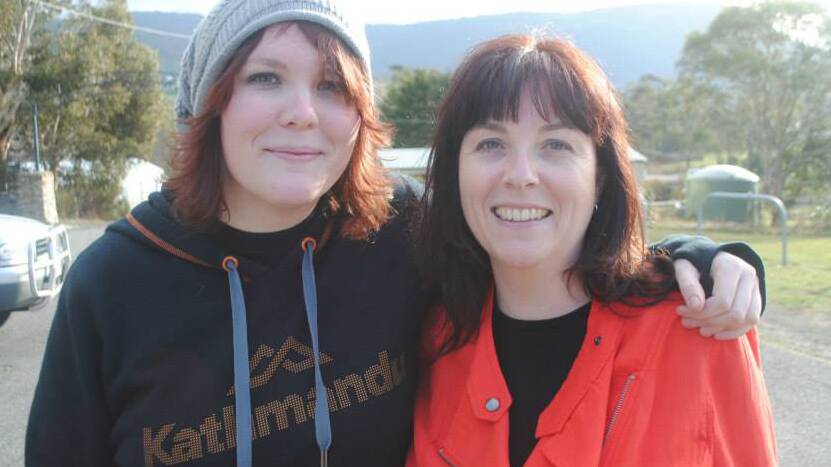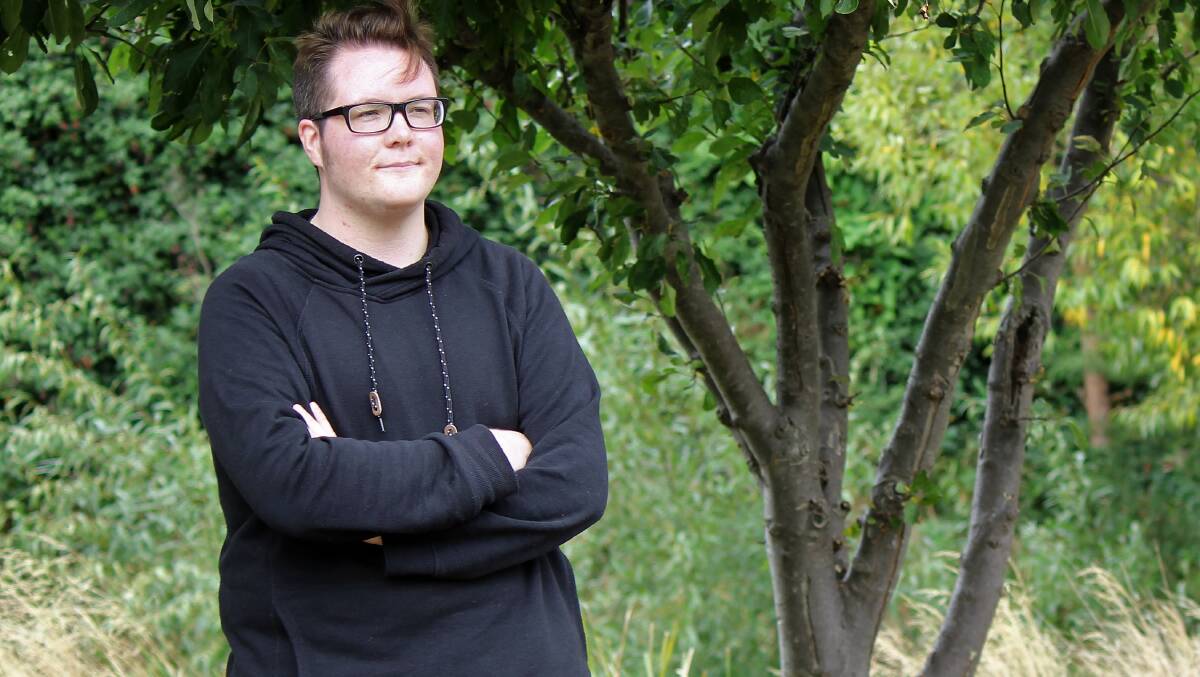Gender transition is a long and complicated process but brings many psychological benefits for individuals on the journey. ISABEL BIRD speaks with Tasmanian Avery Roddam about his female to male transition.
Avery wakes from a four-hour surgery in which his unwanted breasts have been removed and his new chest masculinised.
Subscribe now for unlimited access.
$0/
(min cost $0)
or signup to continue reading
He is groggy, there are tubes running from his wrists and he has four weeks post-operation recovery to get through, but there is an overwhelming, all-consuming emotion passing through him.
Relief.
The 30-year-old describes it as a moment of waking up and instantly feeling like he fitted-in with his true self.
It was a meeting of the body and mind.
“There was literally and figuratively a weight lifted off,” he said.
“Psychologically it was a huge boost.”
Avery’s top surgery performed earlier this year in Victoria was another step in his female to male transition.
He took his first step just three years earlier when he started living and identifying as a male.
“I was on YouTube and I found this guy who was transgender male. I remember watching it and going ‘oh my gosh, that is me’. Then I binge watched every documentary on the topic,” Avery said.
I made pros and cons lists of why this was me, and resolved to spend a year contemplating it
“The problem was, the more I researched, the more entries I made in my journal, the more I thought about my life thus far, the more I couldn’t shake it.”
Avery said he has always had a “subconscious discomfort” about his gender since puberty.
While he owned Barbies and had a doll that he adored, he mostly played with Lego, Matchbox cars, action figures and Star Wars toys.
“I just saw myself as one of the boys. We would be climbing trees and getting into fisticuffs while the girls were having tea parties,” he said.
As a teenager he knew that he did not conform to traditional gender norms.
For a time he believed he was bisexual, but later realised he was heterosexual.
Mostly he travelled through his school and young adult years inhabiting the in-betweens of gender until his “light-bulb moment” at age 27.
He said this moment is different for all transgender people, as is the process of transition, whether it be from female to male, or male to female.
Avery said some people may never go down the medical path, choosing to simply identify as their preferred gender, but generally the process will involve social, medical and legal transitions.
“The process of transitioning is a long one and involves a lot of waiting. It is going from living as a gender you were assigned at birth, to living as the gender you feel you are,” he said.

“It is a process of making your body more closely match who you are in your mind and heart, but also learning to live in a masculine space to understand your new place in society.”
For Avery it involved telling family and friends, changing his name and identity documents, telling his work and colleagues, and presenting as a male by changing his hair, his clothes and binding his breasts.
Avery said he used to hate his voice, his hips and his breasts, and that he used to wear binders, which are straps of material worn across the chest to flatten breasts and appear more masculine.
“I was constantly checking my reflection in shop windows to make sure my binder wasn’t betraying my boobs. If I felt the slightest shift in my chest I would feel the anxiety well-up and my face go red," he said.
He also started seeing a psychiatrist who diagnosed him with gender dysphoria, a diagnosis which is required before a person can start hormone replacement therapy or consider surgery options.
It is diagnosed when individuals experience severe discomfort and dissatisfaction with their bodies and genders, and can include other symptoms such as anxiety and depression.
Starting on testosterone two years ago has helped ease his gender dysphoria symptoms, and he will continue these injections for the rest of his life.
His voice is now deep, he has grown facial hair, and the fat redistribution on his face and body has changed so that he is masculine.
Importantly, Avery has not been "misgendered" or mistaken as a female for more than two years.
In addition to the physical changes that testosterone brings, Avery has also experienced many internal changes.
“A lot of us start the hormones and our sexual orientation will change, for instance, I used to only adore guys before T [testosterone], then I started on T and I ended up bang in the middle as bisexual,” he said
“I was heterosexual and the testosterone has re-wired me. I found it fascinating that hormones did that.”
Avery said sexuality is usually a solid part of a person’s identity and when this changed for him it was unusual and difficult.
“Most people think about their futures and I saw my future as settling down with a guy. Now my role is different, I am the guy, and now it is a mystery for me as I have no idea who [what sexual partner] I will end up with, and I don’t know what settling down will look like.”
He said his brain has also re-wired so that he thinks rationally, with less emotion.
“I used to think with my heart and I would cry a lot. Now I have to work really hard to feel those emotional aspects."
“Most people are open-minded but you can still feel like the elephant in the room if you are surrounded by people who are not trans. You are wondering, how many of these people are transphobic?”
Some of the biggest challenges for transgender and non-binary individuals are connected to social transition.
Avery said the battle to get others to correctly use preferred pronouns is a real one.
Pronouns are the short, identifying words such as 'he', 'she', 'they', ‘their’, 'him' or 'her', that many would have learnt in a grammar lesson and then promptly forgotten.
They are simple words casually slipped into conversations, but they are words that can mean everything to a transgender or non-binary person.
Avery speaks of the hurt he used to feel when he was accidentally misgendered, or when a person deliberately used female pronouns when he was clearly presenting as a male.
He said using a pronoun that is opposite to your birth gender can also be a risk to safety.
This concern sits at the back of Avery's mind, and he worries not just for his own safety but for the safety of transgender friends, especially those transitioning from male to female.
For instance, when he learned that his work colleagues had discovered that he was not a cis male [born as a male], his mind turned to the empty car parking lot that he knew he would have to cross, alone, when his late-night shift ended.
You have to be really careful, especially early in transition, because people are unsure. You look different, you are standing out and people can’t classify you as one or the other.
“You just need to take extra precautions, say if you are walking to your bus stop after the pub, you have to make sure no-one is following you.”
As a female Avery was an optimistic, bubbly, shy-smiling, talkative, endearing, empathetic person.
As a male he is all of these things, but his empathy for those in his position has grown stronger, and he believes the need to normalise transgender and non-binary genders is great.
During his transition Avery has seen the very best of people, receiving overwhelming encouragement from family, friends, acquaintances and strangers, both in real-life and on social media.
Unfortunately he has also experienced the worst in people, which he simply described as "not pleasant".
“Most people are open-minded but you can still feel like the elephant in the room if you are surrounded by people who are not trans. You are wondering, how many of these people are transphobic?”

Avery said he has transgender friends whose family disowned them, banned them from seeing their siblings, or looked for transgender cures.
He said people in Australia have lost their jobs, been bashed, or have had horrible things said to them on the street or online.
“I want people to start seeing transgender people as ordinary people who are just going through some difficult stuff,” Avery said.
“If you aren’t sure about a person’s gender just ask them … it beats misgendering someone and potentially causing them to spiral into depression. This small question can make other people feel really good,” he said.
“Also, if you don’t know somebody’s pronouns ‘It’ is never appropriate. ‘They’, ‘them’ or ‘their’ work fine, even if it feels weird. Languages change and these gender neutral pronouns are in common use for the trans community.”
Avery said his family and friends had to mourn the loss of their daughter, sister, aunt and female friend, and come to terms with his changes.
He too had to acknowledge their pain and suffering amidst his own joy at having finally recognised himself as male.
But at the centre of it all, Avery said his individual rights and the identity rights of all transgender and non-binary individuals should trump all.
“It is someone’s right to be identified as who they want to be identified as,” he said.
“If someone is aware of your chosen pronouns but deliberately won’t use them because they think that you’re being misleading or because they think it [gender diversity] is bullshit, that is horrible. It is just really invalidating.”
These attitudes, while hurtful, have not quelled Avery's animated spirit and zest for life.
He said once he became comfortable with his new maleness, and once every family member and friend knew that he identified as male, and used the correct pronouns, nothing else really mattered.
“This is me … This is who I am.”
- For assistance on this issue: Sexual Health Services Launceston 6777 1371; Working It Out 6231 1200 or 0429 346 122

